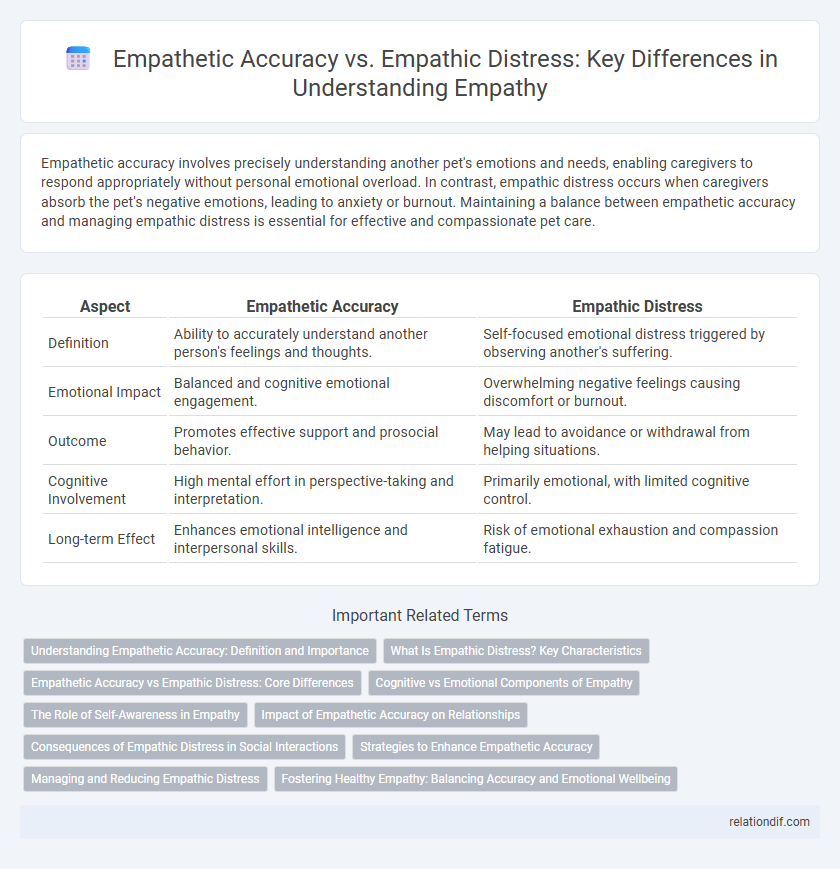Empathetic accuracy involves precisely understanding another pet's emotions and needs, enabling caregivers to respond appropriately without personal emotional overload. In contrast, empathic distress occurs when caregivers absorb the pet's negative emotions, leading to anxiety or burnout. Maintaining a balance between empathetic accuracy and managing empathic distress is essential for effective and compassionate pet care.
Table of Comparison
| Aspect | Empathetic Accuracy | Empathic Distress |
|---|---|---|
| Definition | Ability to accurately understand another person's feelings and thoughts. | Self-focused emotional distress triggered by observing another's suffering. |
| Emotional Impact | Balanced and cognitive emotional engagement. | Overwhelming negative feelings causing discomfort or burnout. |
| Outcome | Promotes effective support and prosocial behavior. | May lead to avoidance or withdrawal from helping situations. |
| Cognitive Involvement | High mental effort in perspective-taking and interpretation. | Primarily emotional, with limited cognitive control. |
| Long-term Effect | Enhances emotional intelligence and interpersonal skills. | Risk of emotional exhaustion and compassion fatigue. |
Understanding Empathetic Accuracy: Definition and Importance
Empathetic accuracy refers to the ability to accurately perceive and understand another person's thoughts and feelings, which is crucial for effective interpersonal communication and relationship building. This skill enhances emotional connection and trust by allowing individuals to respond appropriately to others' emotional states. Unlike empathic distress, which involves feeling overwhelmed by another's emotions, empathetic accuracy promotes balanced empathy, supporting constructive social interactions and emotional regulation.
What Is Empathic Distress? Key Characteristics
Empathic distress occurs when an individual becomes overwhelmed by the negative emotions of others, leading to personal discomfort and emotional exhaustion. Key characteristics include a self-focused emotional response, difficulty maintaining boundaries, and decreased ability to provide effective support. Unlike empathetic accuracy, which involves understanding others' emotions without becoming overwhelmed, empathic distress often results in avoidance or withdrawal.
Empathetic Accuracy vs Empathic Distress: Core Differences
Empathetic accuracy involves accurately understanding another person's thoughts and feelings, enhancing effective communication and social connection, while empathic distress refers to feeling overwhelmed or distressed by another's suffering, which can lead to emotional burnout. High empathetic accuracy fosters prosocial behavior and emotional regulation, whereas empathic distress often triggers avoidance and decreased helping behavior. Distinguishing between these responses is crucial for developing emotional resilience and improving interpersonal relationships.
Cognitive vs Emotional Components of Empathy
Empathetic accuracy primarily involves the cognitive component of empathy, enabling individuals to accurately perceive and understand others' emotions and thoughts. In contrast, empathic distress is linked to the emotional component, where excessive emotional involvement can lead to personal discomfort or distress. Balancing cognitive empathy with emotional regulation is essential to maintain effective interpersonal relationships and avoid emotional burnout.
The Role of Self-Awareness in Empathy
Empathetic accuracy relies on the ability to accurately perceive and understand another person's emotions, which is significantly enhanced by high levels of self-awareness. Self-awareness allows individuals to differentiate their own feelings from those of others, reducing the risk of empathic distress--a state where emotional overwhelm impairs effective empathy. Developing self-awareness promotes a balanced empathic response that supports genuine connection without emotional burnout.
Impact of Empathetic Accuracy on Relationships
Empathetic accuracy, the ability to precisely understand another person's thoughts and feelings, significantly strengthens interpersonal relationships by fostering trust and effective communication. High empathetic accuracy enables partners to respond appropriately to each other's emotional needs, reducing misunderstandings and conflicts. Unlike empathic distress, which can lead to emotional overwhelm, empathetic accuracy promotes emotional resilience and deeper connection in relationships.
Consequences of Empathic Distress in Social Interactions
Empathic distress often leads to emotional overwhelm, reducing an individual's ability to respond effectively in social interactions. This state can trigger avoidance behaviors and diminish prosocial support, adversely impacting relationship quality and social cohesion. High levels of empathic distress may also contribute to burnout, limiting long-term engagement in caregiving or supportive roles.
Strategies to Enhance Empathetic Accuracy
Improving empathetic accuracy involves active listening techniques, such as attending closely to verbal and nonverbal cues to accurately interpret others' emotions and thoughts. Training programs that incorporate perspective-taking exercises and emotional regulation skills help individuals reduce empathic distress and maintain clarity in social interactions. Using mindfulness practices can further enhance focus and emotional resilience, enabling more precise and compassionate understanding of others.
Managing and Reducing Empathic Distress
Managing empathic distress involves developing emotional regulation strategies that prevent overwhelm while maintaining empathetic accuracy. Techniques such as mindfulness, boundary-setting, and perspective-taking enable individuals to stay attuned to others' emotions without becoming emotionally flooded. This balance enhances interpersonal connections and promotes psychological well-being by reducing burnout and compassion fatigue.
Fostering Healthy Empathy: Balancing Accuracy and Emotional Wellbeing
Fostering healthy empathy requires balancing empathetic accuracy--understanding others' emotions precisely--with managing empathic distress, which can overwhelm and impair emotional wellbeing. Training in active listening, emotional regulation, and boundary-setting enhances the capacity to connect deeply without becoming emotionally overwhelmed. This balance supports compassionate interactions that promote psychological resilience and maintain interpersonal harmony.
empathetic accuracy vs empathic distress Infographic

 relationdif.com
relationdif.com